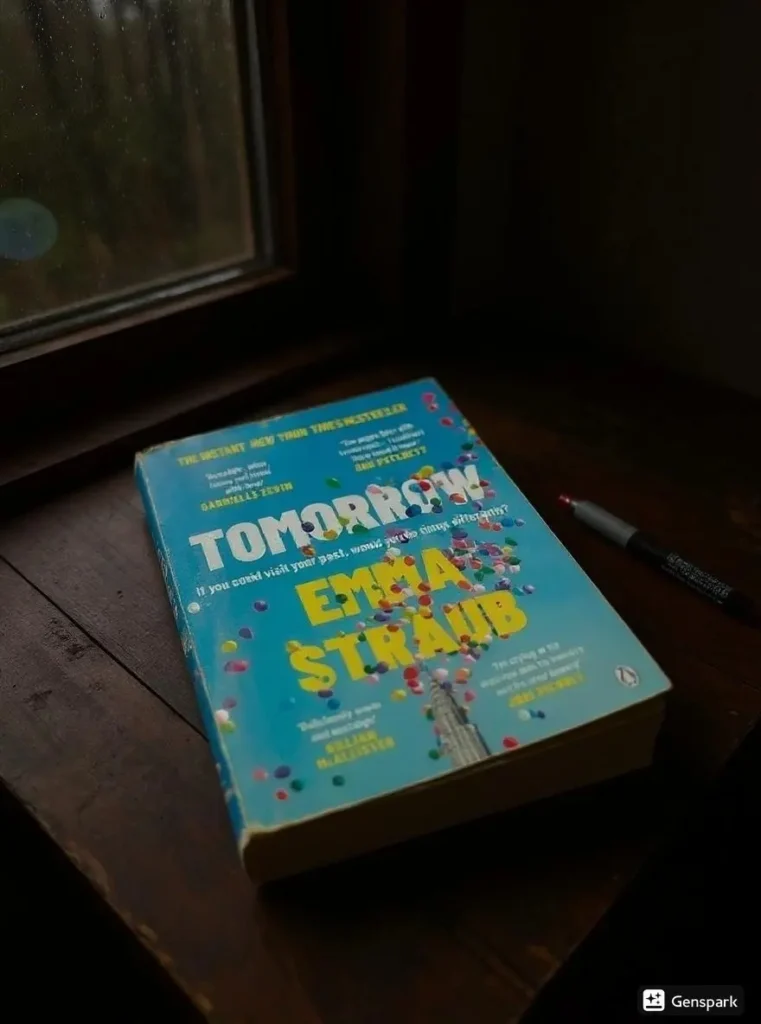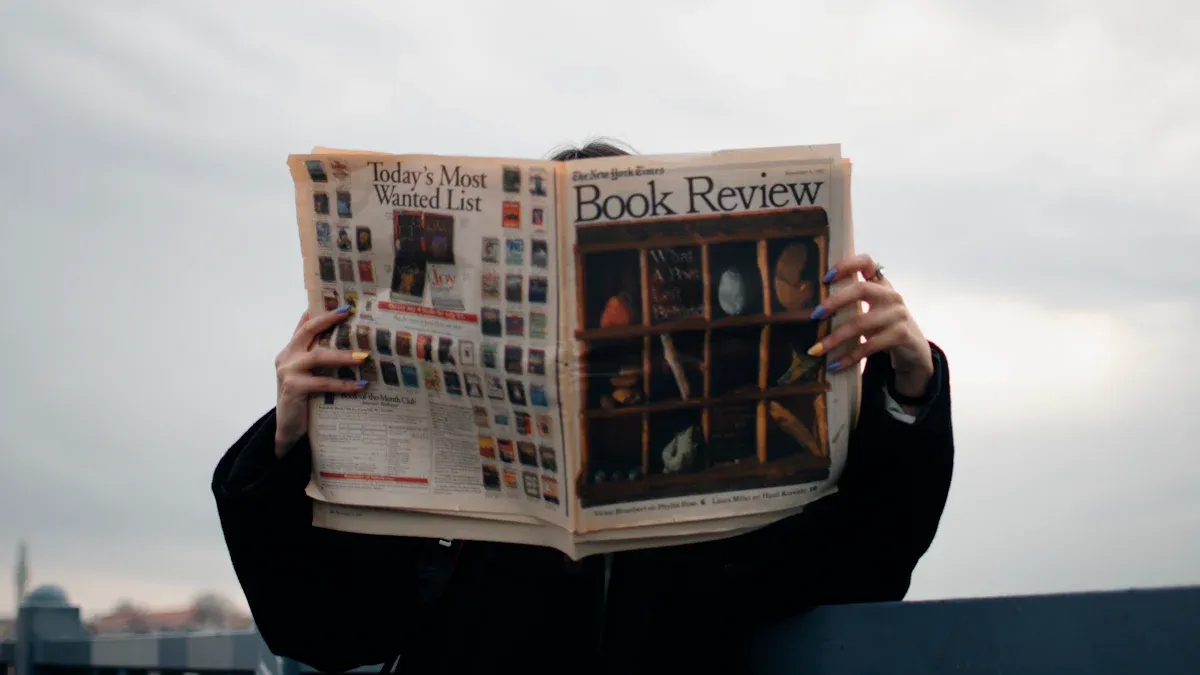I couldn’t sleep at 2 AM, so I started Emma Straub’s “This Time Tomorrow” expecting just another time travel story. Boy, was I wrong – this book left me emotionally drained and questioning every single choice I’ve made in my thirties. Emma Straub’s new novel is a charmer that unleashes the magic of time travel to sweeten its exploration of some heavy themes like mortality, the march of time, and how small choices can alter a life.
I’ve got to be honest – after reviewing over 3,000 books at Dionysus Reviews, I thought I’d seen every possible angle on time travel narratives. This novel completely blindsided me with its raw emotional depth and literary sophistication that goes far beyond typical genre fiction.
A woman who’s been drifting through life wakes up the morning after her 40th birthday to discover that she’s just turned 16 again. Alice Stern’s story becomes a meditation on grief, regret, and the impossible weight of wanting to change everything while accepting that some losses are inevitable. Leonard Stern, her dying father and celebrated sci-fi writer, anchors the narrative with profound tenderness.
Key Takeaways
The book taught me that grief isn’t just about losing someone—it’s about losing all the conversations you’ll never have and all the versions of yourself they’ll never meet. Straub captures this anticipatory loss with surgical precision.
Time travel here isn’t about fixing everything; it’s about learning to treasure what you actually have instead of obsessing over what went wrong. I realized how much mental energy I waste on regret after reading Alice’s attempts to “correct” her past.
The father-daughter relationship becomes the emotional core that transforms a potentially gimmicky premise into something profoundly moving. Leonard Stern’s wisdom and humor shine through every interaction with his daughter.
New York City in both the 1990s and present day functions as almost another character, with Straub’s intimate knowledge of the city creating authentic atmosphere that grounds the fantastical elements.
The novel argues that accepting life’s unchangeable elements—death, loss, the passage of time—might be more valuable than endlessly trying to perfect our choices and relationships.
Basic Book Details:
- Publishing Information: May 17, 2022 by Riverhead Books
- Genre: Literary Fiction with Speculative Elements
- Plot: 40-year-old Alice Stern time travels back to age 16 to spend more time with her terminally ill father
- Series Information: Standalone novel
- Page Count: 336 pages
- Main Characters: Alice Stern (protagonist experiencing midlife crisis), Leonard Stern (Alice’s father, dying sci-fi writer), Sam (Alice’s teenage friend and potential love interest)
Plot Overview And Time Travel Premise
Alice Stern’s Midlife Crisis And Her Father’s Terminal Illness
Alice Stern turns 40 feeling completely lost. Her job at a private school bores her, her romantic relationships have fizzled, and she’s watching her beloved father Leonard slowly dying from cancer. The weight of approaching grief mixed with personal dissatisfaction creates the perfect storm for magical intervention.
I connected deeply with Alice’s sense of being stuck—that feeling when you’re technically an adult but still feel like you’re waiting for your “real” life to begin. Straub captures this modern malaise without making Alice completely unsympathetic.
The Mechanics Of Time Travel And Return To Age Sixteen
The time travel mechanism stays refreshingly simple and unexplained. Alice wakes up as her sixteen-year-old self but retains her adult memories and consciousness. No complex rules, no scientific exposition—just the pure emotional impact of getting a second chance.
What makes this brilliant is how Straub focuses on the emotional rather than logical implications. Alice doesn’t try to prevent 9/11 or win the lottery; she just wants more time with her dad.
Character Development And Relationship Dynamics
Alice Stern’s Dual Consciousness And Character Evolution
Alice’s character development happens on two levels—her teenage self navigating high school again and her adult consciousness processing decades of accumulated wisdom and regret. This creates fascinating internal conflicts as she tries to balance what she knows with what she should naturally know at sixteen.
I found myself mentally cataloging all the times I’ve wished I could tell my younger self something important. Alice’s frustration at not being able to fully communicate her adult perspective felt incredibly authentic.
Father-Daughter Bond And Leonard Stern’s Legacy As Writer
Leonard Stern emerges as the book’s most compelling character. His work as a science fiction writer adds meta-fictional layers as he discusses time travel with his daughter who’s literally experiencing it. Their relationship anchors the entire narrative.
The conversations between Alice and Leonard showcase Straub’s most beautiful writing. These scenes made me want to call my own father immediately—which I did at 11 PM after finishing the book.
Thematic Analysis And Literary Significance
Grief Processing And Anticipatory Loss In Contemporary Fiction
Straub tackles anticipatory grief—mourning someone who’s still alive but dying—with remarkable sensitivity. This isn’t just about death; it’s about watching someone you love fade away slowly while feeling powerless to stop it.
I’ve never read such an accurate portrayal of that specific type of grief. The helplessness, the anger, the desperate bargaining with the universe—Straub captures it all without becoming manipulative or sentimental.

Second Chances Versus Acceptance Of Life’s Unchangeable Elements
The central tension asks whether we should focus on changing what we can or accepting what we cannot. Alice’s time travel adventures become a metaphor for anyone who’s ever obsessed over past decisions.
After reading this, I stopped replaying that embarrassing thing I said at a party in 2019. Sometimes the book you need finds you at exactly the right moment.
Writing Style And Narrative Technique
Emma Straub’s Blend Of Literary Fiction With Speculative Elements
Straub writes with literary fiction’s emotional depth while incorporating speculative elements seamlessly. She never lets the time travel premise overshadow the human story at the book’s center.
The prose feels effortless and conversational while handling complex themes. I highlighted at least twenty passages that perfectly captured feelings I’d never been able to articulate myself.
New York City As Character And 1990s Nostalgia Integration
Straub excels at capturing the essence of a specific place and time with her portrayal of both contemporary Brooklyn and 1990s Manhattan. The city details never feel forced or nostalgic for nostalgia’s sake.
The 1990s elements—from music to fashion to pre-internet social dynamics—create authentic atmosphere without becoming a period piece exercise. Everything serves the story rather than showing off research.
Pros
Emotional Authenticity: Every feeling rings completely true. Straub has clearly experienced loss and writes about it with hard-earned wisdom rather than intellectual exercise.
Character Depth: Both Alice and Leonard feel like complete, complicated human beings rather than plot devices. Their relationship drives every page.
Accessible Time Travel: By keeping the mechanics simple, Straub focuses on emotional impact rather than getting bogged down in sci-fi logistics.
Beautiful Prose: The writing flows naturally while tackling heavy themes. Straub finds humor and lightness even in grief without minimizing the pain.
Authentic Setting: New York City feels lived-in and real across both time periods. The locations support rather than distract from the story.
Cons
Predictable Arc: Once you understand the premise, the emotional beats follow a fairly expected pattern. The book doesn’t surprise you plot-wise.
Limited Scope: The narrow focus on Alice and Leonard, while effective, means other characters feel underdeveloped. Sam particularly could have used more depth.
Convenient Resolution: Some plot elements resolve a bit too neatly for a story supposedly about accepting life’s messiness.
Genre Limitations: Readers wanting either pure literary fiction or complex sci-fi might find the hybrid approach unsatisfying.
Final Verdict
“This Time Tomorrow” succeeds as both an emotionally resonant family story and a thoughtful time travel narrative. Straub proves that speculative elements can enhance rather than diminish literary fiction when handled with skill and restraint.
This book wrecked me in the best possible way. I sobbed through the last fifty pages but closed it feeling grateful for every complicated relationship in my life. That’s the mark of exceptional storytelling.
If you’re dealing with aging parents, questioning your life choices, or just want to read something that will make you appreciate what you have, pick up this book. Just maybe don’t start it at 2 AM unless you’re prepared to stay up until dawn.
The novel works best for readers who enjoy character-driven stories with fantastical elements grounded in emotional reality. Skip it if you prefer high-concept sci-fi or purely plot-driven narratives.
Dionysus Reviews Rating: 7/10
Sip The Unknown—Discover Stories You Never Knew You’d Love!
Dionysus Reviews Has A Book For Every Mood
Biography & Memoir
Fiction
Mystery & Detective
Nonfiction
Philosophy
Psychology
Romance
Science Fiction & Fantasy
Teens & Young Adult
Thriller & Suspense
Frequently Asked Questions
What makes this book different from other time travel stories?
Unlike most time travel fiction that focuses on changing major historical events or preventing disasters, “This Time Tomorrow” uses the concept purely for emotional exploration. Alice doesn’t try to alter world events—she just wants more time with her dying father. This intimate approach makes the fantastical elements feel grounded and meaningful rather than escapist.
How does Emma Straub handle the father-daughter relationship without being overly sentimental?
Straub balances deep emotion with realistic complexity. Leonard and Alice don’t have a perfect relationship—they argue, misunderstand each other, and struggle with communication like real family members. The author includes moments of frustration and disappointment alongside the tenderness, creating an authentic portrait of love that doesn’t ignore life’s difficulties.
Does the book require knowledge of science fiction to appreciate the time travel elements?
Not at all. Straub deliberately keeps the time travel mechanics simple and unexplained, focusing instead on the emotional consequences. The book functions more as literary fiction with speculative elements than traditional sci-fi. Leonard’s background as a science fiction writer adds some meta-textual depth, but it’s not necessary to understand those references to enjoy the story.
How does the 1990s setting contribute to the overall narrative?
The 1990s setting serves multiple purposes beyond nostalgia. It represents Alice’s last period of genuine happiness with her father before adult responsibilities and his illness complicated their relationship. The pre-digital world also creates space for deeper human connections—characters actually talk to each other instead of being distracted by phones and social media. The time period becomes symbolic of simpler, more present-focused living.
What should readers expect emotionally when reading this book?
Be prepared for an emotional experience, especially if you have complicated relationships with parents or have dealt with anticipatory grief. The book doesn’t shy away from the pain of watching someone you love decline, but it balances that heaviness with genuine humor and moments of joy. Many readers report crying while reading, but most describe it as cathartic rather than devastating.









